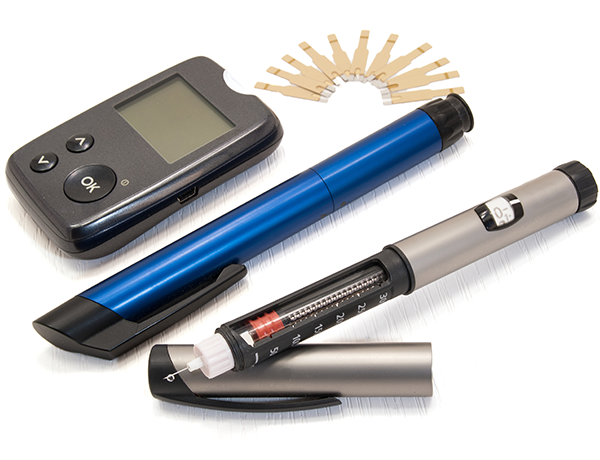For Best Results, Insulin Pens Need Preparation
 For many patients, insulin injection is a key part of diabetes management, and pharmaceutical companies continue to innovate with ever-more convenient delivery methods. One advance has been the pre-mixed ‘NPH insulin pen,’ a convenient all-in-one device that eliminates the need for separate needles and vials. However, the results of a recent study highlight the importance of proper preparation of an NPH insulin pen: namely, shaking it to ‘resuspend’ the medicine inside.
For many patients, insulin injection is a key part of diabetes management, and pharmaceutical companies continue to innovate with ever-more convenient delivery methods. One advance has been the pre-mixed ‘NPH insulin pen,’ a convenient all-in-one device that eliminates the need for separate needles and vials. However, the results of a recent study highlight the importance of proper preparation of an NPH insulin pen: namely, shaking it to ‘resuspend’ the medicine inside.
Inside an NPH insulin pen is a mixture of crystals and liquid that settles into unequal proportions over time. Without shaking, the researchers discovered that patients’ blood sugar control varied widely, far less reliable than the correctly prepped pens would deliver. To sufficiently resuspend the insulin in an NPH device, the pen should be tipped back and forth 20 times just before injection. And when it comes to proper technique for any medication in your regimen, you can always reach out to your doctor or Residential Home Health clinician for help.
(Shake, shake, shake your NPH insulin pen before injecting; Reuters)
Giving Patient Care a (Signal) Boost
Even as we embrace technology, we may be hesitant to replace a tried-and-true home or office visit with a phone call or e-mail message. However, the rise of video chatting may be a competent addition to some patients’ plans of care. A small study of veterans found no difference in effectiveness between post-operative appointments conducted via video versus in person; in fact, many of the study subjects actually preferred the video visit for its convenience. More research and larger studies could very well translate to more high-tech options for routine follow-up care.
(Telehealth visits may be an option after surgery; Reuters)
A new study out of Australia found that a program of regular text-message reminders led to better management of heart disease. The results suggest that gentle reminders to stay on track may be an effective way to extend patient care between visits.
(A text message a day may keep the doctor away; Reuters)
A Very Good Year for Flu Immunization
Making the annual flu vaccine is an inexact science — influenza strains change from year to year, and it takes predictive power to guess which strains might spike. Last year’s vaccine was less effective, as a key strain mutated after the formula was complete and in production. However, the Centers for Disease Control are optimistic that this year’s vaccine is better situated to tamper the flu’s scope and severity. As flu season gets ready to ramp up (generally October through May, peaking in December through February), read up on the importance of vaccination and make plans to get flu shots for yourself and those close to you.
(CDC Says Flu Vaccine Should Be More Effective This Season; NPR)
Protecting seniors from preventable diseases starts with senior immunizations, but it doesn’t have to end there. Adult loved ones and caregivers who are vaccinated can lend another layer of protection — after all, a loved one who doesn’t get infected can’t pass the infection along.
(Flu shots for adults under 65 may boost protection for seniors; Reuters)
Other News
- Hearing loss is more than just missing out on conversation — it’s not knowing what, exactly, you’re missing. Headaches and stress can come from straining to listen, and other setbacks may also be related to poor hearing. (Hearing Loss Costs Far More Than Ability to Hear; NYT Well blog)
- Blood pressure levels at bedtime have been found to be an indicator for development of type 2 diabetes. In a follow-up study, taking blood pressure medication just before bed was found to help subjects prevent diabetes onset. (Although these results are compelling, it bears repeating that you should never change your medication regimen without consulting your doctor.) (Blood pressure medication before bed could lower risk of diabetes; MNT)
- Speaking of type 2 diabetes prevention, a long-term study demonstrated that while drug intervention may help, nothing beats good ol’ healthy lifestyle changes. (Over long term, diet and exercise are best to prevent diabetes; Reuters)
- The cost of many medications is climbing. This piece investigates some avenues that patients may take to comparison shop, appeal for assistance, and reduce their out-of-pocket costs. (How To Save Money On Prescription Drugs, Insured Or Not; NPR)
- The more food put in front of us, the more we eat…and a bigger plate often translates to a bigger portion. An act as simple as starting with a smaller plate — or ordering a smaller size — can help curb overeating. (To eat less, consider smaller plates and packages; Reuters)
- On the one hand, based on this recent study, sugar-sweetened beverages (such as colas) may not be solely responsible for obesity and related conditions like type 2 diabetes. On the other hand, the connection made between these drinks and poor overall diet reinforces that consuming them is a likely detriment to your health. (High consumption of sugar sweetened beverages linked to overall poor diet; MNT)
- Vitamin D deficiency has been tied to Alzheimer’s risk, and new study has shown a correlation between vitamin D levels and the rate of cognitive decline. (Low vitamin D levels linked to faster memory loss in older adults; Reuters)
{{cta(‘44893e99-97c2-42f8-936a-6798128c709b’)}}

